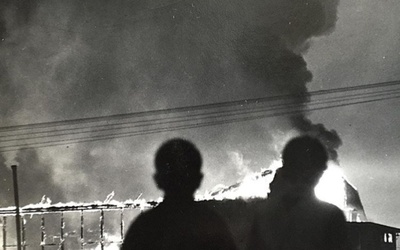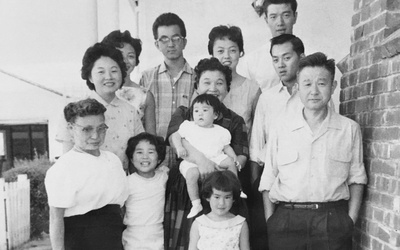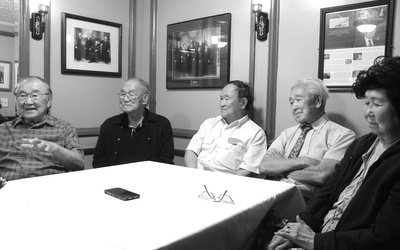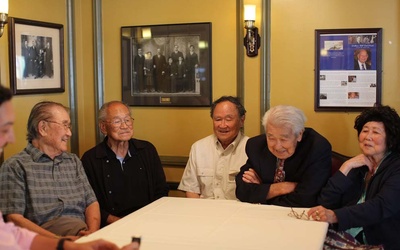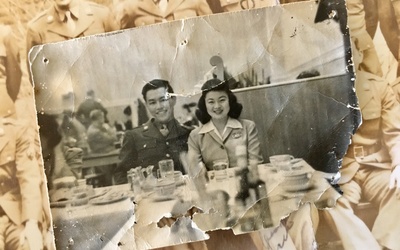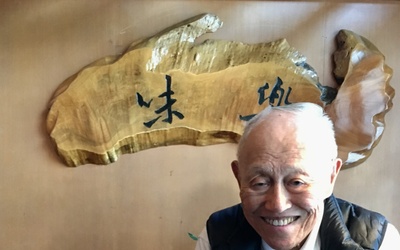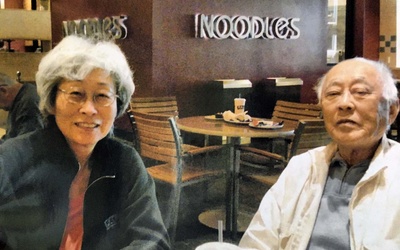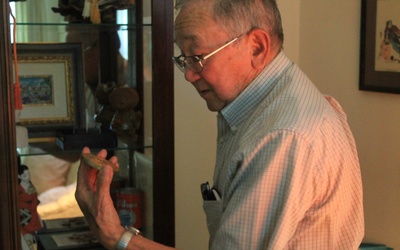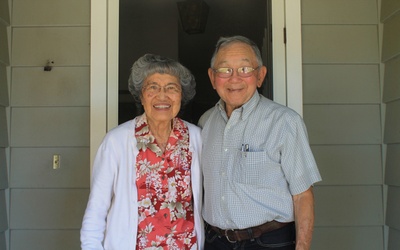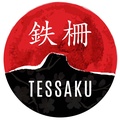
Emiko Tsuchida
@emikotsuchidaEmiko Tsuchida is freelance writer and digital marketer living in San Francisco. She has written on the representations of mixed race Asian American women and conducted interviews with some of the top Asian American women chefs. Her work has appeared in the Village Voice, the Center for Asian American Media, and the forthcoming Beiging of America series. She is the creator of Tessaku, a project that collects stories from Japanese Americans who experienced the concentration camps.
Updated December 2016
Stories from This Author
Mitsuki Mikki Tsuchida - Part 3
Jan. 10, 2018 • Emiko Tsuchida
Read Part 2 >> Can you tell me about the picture of you and your friend looking at the fire? My friend and I could see the fire on the opposite side of the camp. It was the auditorium where they used to show movies. We could see the flames and the smoke just billowing in that direction, and of course hear the sirens in the distance. So we were watching and we could see the design of the camp. …
Mitsuki Mikki Tsuchida - Part 2
Jan. 9, 2018 • Emiko Tsuchida
Read Part 1 >> What about the day you left for the assembly center? All I remember was waiting at the train station on one side of a line. There were all these ruddy face Caucasians, all just looked red to me. All I remember is that these guys were holding guns. They weren’t pointing them, but what were we going to do? They didn’t even have to carry it. After that I noticed the difference. Why are we standing …
Mitsuki Mikki Tsuchida - Part 1
Jan. 8, 2018 • Emiko Tsuchida
“Army trucks would pull up and someone would shout down, ‘How many in your family?’ And they would just throw the toilet paper and you had to go pick it up. And that lack of human dignity, it just went on and on.” — Mitsuki Mikki Tsuchida When I first started asking my dad about vivid camp memories, my dad would tell me how the alkaline sandstorms used to force the kids to run and hide, or that the piercing …
The Oka Family - Part 2
Dec. 20, 2017 • Emiko Tsuchida
Read Part 1 Diana Tsuchida (DT): Did you ever feel any sense of prejudice before the war? Eva: Well, we lived on a farm with other Japanese people. We were sharecropping. Our whole school, Orchard School on Gish Road, was three-quarters Japanese. Casey Coe (CC): What did you grow on the farm? George: Raspberries, cucumbers. I had to wake up at 2 o’clock in the morning to help my father irrigate the raspberries. I was just in grade school. CC: …
The Oka Family - Part 1
Dec. 19, 2017 • Emiko Tsuchida
“All my normal U.S. citizens rights were taken away from me, just for what? Japan went to war with America? We were Americans. That’s what I really resent.” — Amos Oka This Oka family roundtable provided a rare opportunity to hear five siblings in their late 80s and early 90s have a candid conversation about their memories from camp and WWII. While some of what the younger siblings remembered was light-hearted play and the older siblings remembered farming and hardship, …
George Shimizu - Part 2
Dec. 7, 2017 • Emiko Tsuchida
Read part 1 How did you and your wife meet? It’s a long story. Do you want to hear it? I do, I’m sure it’ll be a good story. This is in June of 1941, before Pearl Harbor, I get to Los Angeles and I’m staying with the Fujisaka family. So in those days, there were a lot of Boy’s clubs and Girl’s clubs and George Fujisaka [a friend] was a member of the Shamrocks. And my wife to be …
George Shimizu - Part 1
Dec. 6, 2017 • Emiko Tsuchida
“I could hear a sailor behind me saying, ‘White flag, 2 o’clock, four hundred yards.’ Those were magic words, I’ll never forget it.” — George Shimizu MIS veteran George Shimizu has just celebrated his 97th birthday this past June. And in a way that one can only hope to live out their sunset years, his infectious outlook on life and crystal clear memory defies his age. George has lived some extraordinary experiences that cross cultural and national borders: He went …
Grace Izuhara
Nov. 17, 2017 • Emiko Tsuchida
“I remember my father saying how angry he was and that he would never again vote. And he never did." —Grace Izuhara Grace Izuhara’s family was one of the “lucky” few that escaped imprisonment in the camps during WWII, heading east to Utah to work on sugar beet farms, a vital wartime staple. “Lucky,” because despite their independence, anti-Japanese fervor still ran high in their new town of Clearfield, resulting in a few traumatic events that Grace can still picture. …
Sherman Kishi - Part 2
Nov. 1, 2017 • Emiko Tsuchida
Read Part 1 >> After you were in training, you were aware that it was leading up to the occupation of Japan? Yes, we expected that all along. The first thing was we got shipped out of San Francisco in July of 1945 and we were sent to the Philippines. They had ATIS–Allied Translation and Interpreter Section–part of the U.S. army and we were stationed close to Manila. We were there about the end of July and of course the atom …
Sherman Kishi - Part 1
Oct. 31, 2017 • Emiko Tsuchida
"After they gave us the redress, it just really relieved all of us who had been in the camp. Because camp was sort of a feeling of shame, that you had to be in a place like that. So we didn’t talk about it.” — Sherman Kishi Down a tucked away country road in Livingston, California sits a ranch-style house, welcoming guests with a driveway full of poppies. Adjacent to this house lies lush farmland filled with almond trees and …

